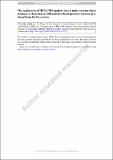| dc.contributor.author | Wang, Yu | |
| dc.contributor.author | Liu, Di | |
| dc.contributor.author | Crowell, Laura E | |
| dc.contributor.author | Love, Kerry R | |
| dc.contributor.author | Wu, Shiaw-lin | |
| dc.contributor.author | Hancock, William S | |
| dc.date.accessioned | 2021-09-20T17:30:21Z | |
| dc.date.available | 2021-09-20T17:30:21Z | |
| dc.date.issued | 2019-08-24 | |
| dc.identifier.uri | https://hdl.handle.net/1721.1/131809 | |
| dc.description.abstract | Abstract
Interferons are signaling proteins that belong to the large class of cytokines and human interferons which are classified based on the type of receptor interactions: type I, II and III. IFNα2b belongs to the type I interferon class with a major therapeutic application for the treatment of hepatitis B and C infections. A recombinant form of IFNα2b expressed in E. coli, known as IntronA, has been approved by US Food and Drug Administration (FDA). IFN γ, also known as type II interferon, plays a significant role in the inhibition of viral replication. Actimmune® is a US Food and Drug Administration (FDA) approved version of IFN γ for the indication of reducing infections associated with chronic granulomatous disease and severe malignant osteopetrosis. In this study we have applied advanced analytical methods for the characterization of IFNα2b and IFN γ produced from Pichia pastoris. The multi-enzyme digestion approach has been developed to allow measurement of 100% sequence coverage and detailed analysis of post-translational variants and degradation products. In this manner, we identified the following variants in IFN α2b: N-terminal residual leader sequence, an amino acid substitution, oxidation of methionine residues and two sites of high mannose N-glycosylation. In the Pichia IFN γ produced material, our approach detected variants resulting from glycosylation, C-terminal proteolysis, oxidation of methionine residues and deamidation. In this manner, the analytical program was able to support rapid process development as well as identify product variants and degradation products in the resulting product. | en_US |
| dc.publisher | Springer Vienna | en_US |
| dc.relation.isversionof | https://doi.org/10.1007/s00726-019-02772-9 | en_US |
| dc.rights | Article is made available in accordance with the publisher's policy and may be subject to US copyright law. Please refer to the publisher's site for terms of use. | en_US |
| dc.source | Springer Vienna | en_US |
| dc.title | The application of HPLC/MS analysis with a multi-enzyme digest strategy to characterize different interferon product variants produced from Pichia pastoris | en_US |
| dc.type | Article | en_US |
| dc.contributor.department | Koch Institute for Integrative Cancer Research at MIT | |
| dc.eprint.version | Author's final manuscript | en_US |
| dc.type.uri | http://purl.org/eprint/type/JournalArticle | en_US |
| eprint.status | http://purl.org/eprint/status/PeerReviewed | en_US |
| dc.date.updated | 2020-09-24T20:43:10Z | |
| dc.language.rfc3066 | en | |
| dc.rights.holder | Springer-Verlag GmbH Austria, part of Springer Nature | |
| dspace.embargo.terms | Y | |
| dspace.date.submission | 2020-09-24T20:43:10Z | |
| mit.license | PUBLISHER_POLICY | |
| mit.metadata.status | Authority Work and Publication Information Needed | |
